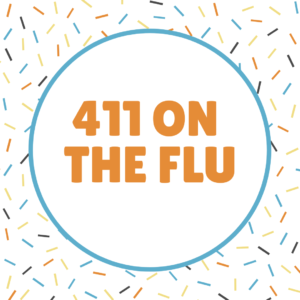The 411 on the Flu
It’s that time of year again…time to get your flu shot. With the kids back in school and freezing temps on the way, now’s the time to schedule your shot. Dr. Jessica Long gives us the lowdown on the flu and why it is so important to get vaccinated.
As a pediatrician, I see things through a different lens than the average parent. It’s a blessing and a curse. Back to school to me doesn’t just mean new clothes and backpacks – it means the swapping of germs with all your classmates. Grapes are tasty, nutritious choking hazards that must be cut into quarters. Monkey bars are fun and great for motor development but also keep emergency rooms in business. The long-awaited arrival of Fall means comfy sweaters and the rustle of fallen leaves…but also your flu shot is due! I can be such a killjoy, or so my husband says.
Flu peaks in the United States during December through March but we can see cases as early as September and as late as May. That’s what makes this time of year perfect for getting your annual flu vaccine since it takes two weeks to receive maximum protection from it. Just as in 2016, this year only the flu shot is available since the Flu Mist (the nose spray form of the vaccine) was not protecting people as much as we would like.
Avoiding contact with the flu virus is nearly impossible, so vaccination is the best way to ensure you do not get the flu this season. Flu spreads through droplets made when people cough, sneeze, or talk, making it very easy to share among your office, school or family. You can also get the flu by touching a surface or object that has the flu virus on it and then touching your own mouth, eyes or nose. In fact, the flu virus can live on a hard surface for 24 hours – gross!
Even though we all try to stay home and away from others when we are ill, you may have spread the flu before you were even sick! Most healthy adults can infect others with the flu one day before they have symptoms. People can remain infectious for 5-7 days after becoming sick. Some, like our young children, might be able to infect others for an even longer period of time.
Most people are familiar with the common symptoms of the flu (fever, cough, sore throat, stuffy nose, muscle aches, headache, and fatigue) but kids can also have vomiting and diarrhea. Our children are also more likely to develop “secondary infections” – a bacterial infection on top of the flu – such as an ear infection or pneumonia. And while we all know the flu is miserable, it’s easy to forget that for many of our friends and neighbors, especially infants and the elderly, it can be truly dangerous.
If all of this hasn’t convinced you to head over to your doctor’s office for the flu shot, remember that not only do you protect yourself with your vaccine but you also protect all of those important people around you from getting sick this flu season as well! Your kids will thank you for it!



